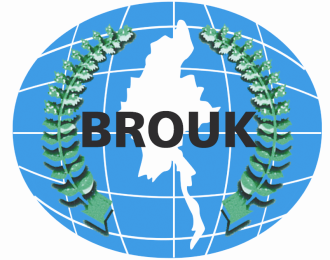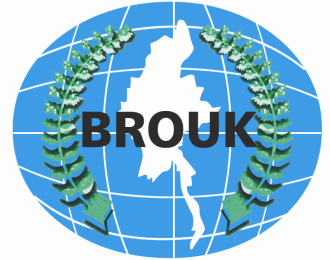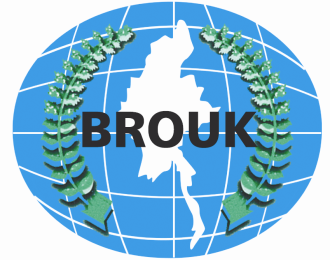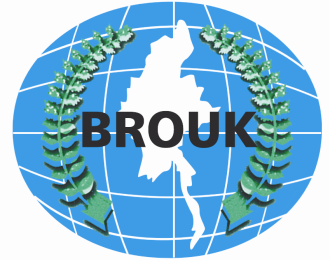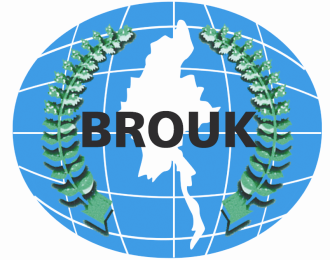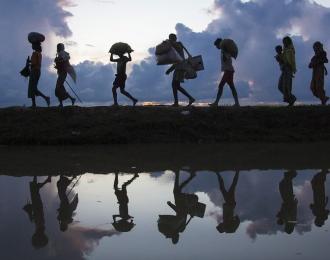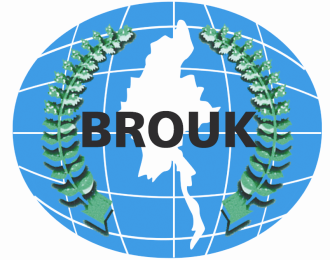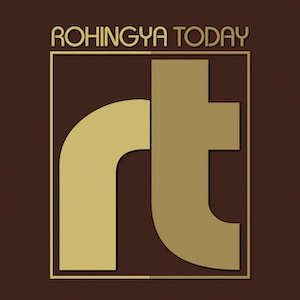
Media Release from Burmese Rohingya Organisation UK – for immediate release
BROUK condemns junta’s airstrikes targeting vulnerable Rohingya civilians in Burma’s Rakhine State, calls for urgent UN Security Council meeting
The Burmese Rohingya Organisation UK (BROUK) today condemned Burmese military airstrikes targeting vulnerable Rohingya civilians in Burma’s Rakhine State and called for the government of the United Kingdom (UK) to urgently convene a United Nations (UN) Security Council meeting on the escalating crisis. At least 38 Rohingya civilians – 15 of them children - have been killed by airstrikes in recent weeks.
“Airstrikes and other attacks on Rohingya villages are an escalation of violence and a clear violation of the provisional measures ordered by the International Court of Justice to protect the Rohingya,” said Tun Khin, President of the Burmese Rohingya Organisation UK. “The UK must urgently convene a UN Security Council meeting and take concrete steps to protect not only the Rohingya, but all civilians in Rakhine State and across Burma.”
On 18 March, a fighter jet attack by the regime on Thar Dar Rohingya village in Minbya, Rakhine State is reported to have killed 22 Rohingya civilians, half of them children. At least 30 more were seriously injured. The regime effectively lost control of Minbya township to the Arakan Army (AA) on 6 February and there was no fighting taking place at the time.
BROUK has documented other similar attacks. On 9 February, a fighter jet bombed Ambari Rohingya village in Kyauktaw township late at night, killing four Rohingya civilians including two children, and injuring 25. There was no fighting happening in the area at the time and the Arakan Army did not have a presence nearby. Survivors of the attack fled to other Rohingya villages in the township area, including the large Rohingya village of Paik Thei just south of Kyauktaw town.
Paik Thei village was attacked by a fighter jet two days later, late at night on 11 February. 12 Rohingya civilians including two children were killed, and 16 were injured. BROUK has obtained video footage of the immediate aftermath of this attack. This distressing footage clearly shows that Rohingya civilians were targeted in their own homes. Again, there was no fighting happening in the area at the time. Villagers described going outside as they had internet access for the first time after many days, when a fighter jet bombed the area where dozens of people were gathered. Some reports indicate that a fighter jet attacked Gispanadi bridge to the south of Paik Thei village at around the same time, where AA soldiers are believed to have taken up position. However, this potential military target should have been clearly distinguishable from a large Rohingya village of some 11,000 inhabitants.
International humanitarian law (IHL) applies to the internal armed conflict in Rakhine State. One of the main purposes of IHL is to protect civilians. It requires all parties to a conflict to take precautionary measures to minimise harm to civilians and civilian objects, which includes providing effective warnings to civilian populations. Parties must distinguish between combatants and civilians and between military and civilian objects. Reprisal attacks against civilians are prohibited in all circumstances, regardless of the behaviour of the other party to the conflict. Attacks against civilians and civilian objects are prohibited and may constitute war crimes.
BROUK President Tun Khin said, “Burma’s military regime continues to commit atrocity crimes with total impunity, this time war crimes against innocent Rohingya civilians including many children. We urgently need coordinated international action to effectively sanction the sale of aviation fuel to the military and stop these airstrikes on civilians. This is just one step the UN Security Council could take.”
The regime has frequently disrupted basic communication services across all 17 townships in Rakhine State, including internet connectivity and mobile phone networks. Such communication blackouts leave all civilians in Rakhine State exposed and vulnerable, as they cannot receive warnings in advance of fighting to enable them to get out of harm’s way. Communication blackouts also heighten the risk of atrocity crimes and make it difficult for organisations like BROUK to document what is happening on the ground.
Particular vulnerabilities of the Rohingya
While all civilian populations in Myanmar are at grave risk during the intensifying armed conflict, the Rohingya experience heightened vulnerability due to their identity and the regime’s genocidal policies and practices towards them. These include the denial of citizenship and tight restrictions on freedom of movement, effectively containing the Rohingya in an open-air prison in Rakhine State. This leaves the Rohingya uniquely vulnerable.
While many Rakhine residents have fled the state capital of Sittwe, over 100,000 Rohingya internally displaced people are detained in camps and are trapped there as the conflict moves ever-closer to the city. Although the AA has not yet reached Sittwe, Rakhine and Rohingya civilians have been killed in attacks by the regime. On 8 March, five Rohingya civilians including two children were killed and several were seriously injured when Police Battalion No.12 shelled Kathe quarter, a Rohingya neighbourhood next to Aung Mingalar in Sittwe. Three Rohingya were also among the 12 civilians killed in the navy’s shelling of Sittwe municipal market on 29 February.
As part of the genocide case brought by the Gambia against the State of Myanmar, in January 2020 the International Court of Justice (ICJ) ordered Myanmar to ‘take all measures within its power’ to prevent irreparable harm against the Rohingya. The Court described the Rohingya remaining in Myanmar as ‘extremely vulnerable’ and recalled that the State's obligations to prevent and punish the crime of genocide apply at all times, including in situations of internal armed conflict. The ICJ is the UN court and as penholder on Myanmar at the UN Security Council it is the responsibility of the UK to convene a meeting to discuss these breaches of the court’s order. Despite repeated requests from BROUK and other organisations, the UK has failed to do so.
For more information, please contact Tun Khin +44 (0) 7888714866
Note to editors:
The regime’s airstrikes on Rohingya villages in Kyauktaw township came several days after losing its Military Operation Command 9 (MOC 9) to the AA on 7 February in a major battle involving ground, air, and naval forces. MOC 9 is one of 21 such military command centres across the country, and one of three in Rakhine State. The AA is also reported to have attacked and sunk three naval vessels retreating from MOC 9 on 8 February, in the area just south of Ah Pauk Wa village on the Kaladan river.
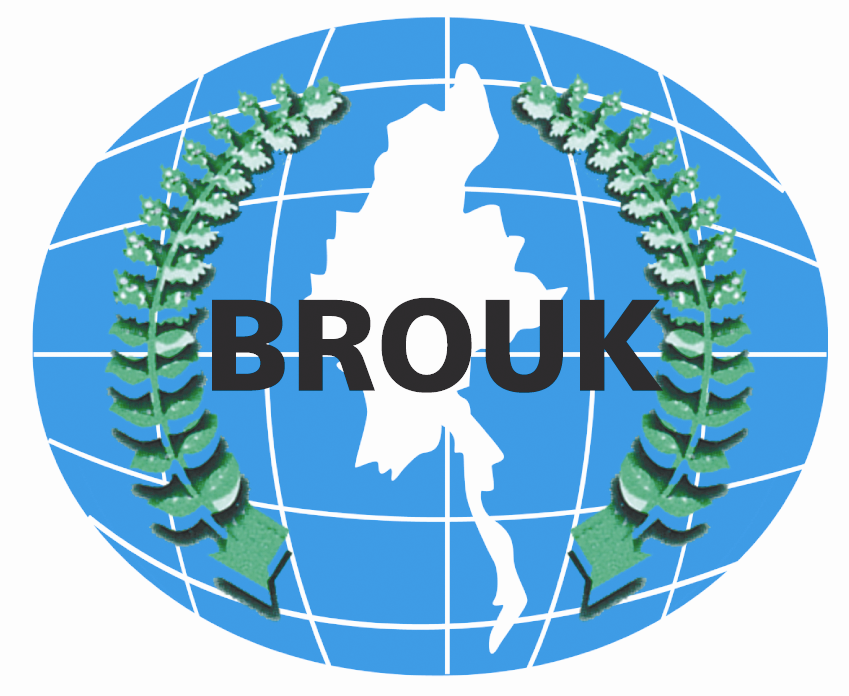
![Locals evacuate Rohingya refugees from a boat that came ashore on the north coast of Indonesia's Sumatra island in June 2020. The UNHCR says the journey across the Andaman Sea last year was deadlier than ever before [Rahmad/Antara Foto via Reuters]](/sites/default/files/styles/grid_list_330x260_/public/2025-05/2020-06-25T000000Z_355446050_RC2CGH9LTK3V_RTRMADP_3_INDONESIA-ROHINGYA.jpeg?itok=V6ouOxeq)
